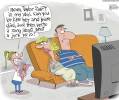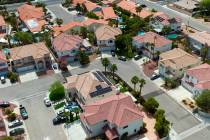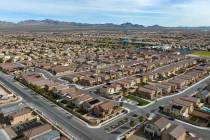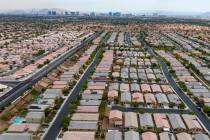BLIGHT ON THE BLOCK

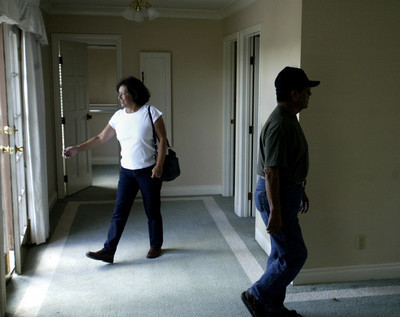
Kathy Shadewald worries about the strangers prowling, at all hours around the luxurious but vacant home next to hers. Are they prospective bidders in the upcoming auction? Or prospective burglars looking for copper-rich plumbing to strip and sell for scrap?
Danielle Yeager prunes the tree in her front yard at noon on a warm day and wishes the banks that own four homes on her street would exhibit equal care. Another neighbor, who asked not to be identified, said the properties near his, no longer sprayed periodically by pest-control companies, are becoming mother countries for cockroaches colonizing his block.
Even though they didn’t personally participate in the financial deals that led to the vacancies, neighbors pay some of the social costs as houses in foreclosure, or surrendered to the mortgage holder to avoid foreclosure as was the one in Shadewald’s neighborhood, go vacant.
Those costs don’t stop with untrimmed shrubbery and unsprayed baseboards. Some of the other costs, soon to be apparent, include:
• Deterioration of a neighborhood standard of property maintenance.
• Declining values of homes near foreclosed residences.
• Increased crime in neighborhoods with many foreclosures.
• New kinds of fraud feeding on desperate investors and homeowners.
The house near Shadewald’s wasn’t foreclosed, but was surrendered to the bank by the homeowner. Auctioned on Sept. 30, it drew a high bid of $430,000, according to the auction company. The sale does not become final until the bank accepts the bid.
Meanwhile, the big, valuable palm trees were beginning to look thirsty.
In Yeager’s southwest Las Vegas neighborhood of two-story homes on small lots, the visible changes didn’t become apparent as soon as several houses went into foreclosure. "Those houses have never been maintained as well as the ones owned by the people who live in them," she said. "As far as I can tell they were always owned by people who were renting them out."
She hopes some will be bought by owner-occupants who might be more concerned with the homes’ appearance.
Complaints about stagnant swimming pools in urban Clark County were 40 percent higher in the first eight months of 2007 compared with the same period a year ago: 937 in 2006 compared with 1,310 this year.
"I would presume that the number of these in vacant homes are rising because the overall number is rising so fast," said Mark Bergtholdt, environmental health supervisor for the Southern Nevada Health District.
Mary Ann Price, a public information specialist for the city of Las Vegas, said pool complaints have increased proportionally in the city but complaints about uncut weeds have dropped from last year.
"But the weed complaints may be lower because of variables," she pointed out. "We had a very dry summer and weeds wouldn’t grow as quickly as otherwise."
Dan Immergluck of the Georgia Institute of Technology and Geoff Smith of Woodstock Institute conducted a study concluding that each foreclosure of a conventional single-family loan within one-eighth mile of another single-family home lowered the value of the latter home by at least 0.9 percent. (That was their most conservative estimate; the decline could be as much as 1.14 percent.)
Although 0.9 percent doesn’t sound like an unbearable burden for each affected homeowner, it adds up. Because there are many houses within one-eighth mile of a typical foreclosure, homeowners who never participated in the failed mortgage, either as lender or borrower, were collectively on the hook for about $159,000. The conclusions, based upon actual real estate sales in Chicago in 1998 and 1999, was published in a 2006 paper called "The External Costs of Foreclosure: The Impact of Single-Family Mortgage Foreclosures on Property Values."
That crime might also increase in the neighborhood of foreclosures was stated as a given in the article’s preamble.
"Since at least the late 1960s, foreclosures of single-family homes … have been viewed as a serious threat to neighborhood stability and community well-being. Foreclosures, particularly in lower-income neighborhoods, can lead to vacant, boarded-up, or abandoned properties. These properties, in turn, contribute to physical disorder in a community, create a haven for criminal activity, discourage the formation of social capital, and lead to further disinvestment."
Yet, even though that view already had the status of conventional wisdom, the same authors claim to have proved it once more in a separate study in 2006.
"Higher levels of foreclosures do contribute to higher levels of violent crime, although the results for property crime are not statistically significant," they wrote. An increase of fewer than three foreclosures a year for every 100 owner-occupied homes in a neighborhood, they found, corresponds to about a 6.7 percent increase in violent crime.
The mortgage meltdown in Las Vegas might be too young to produce the expected spike in neighborhood crime. A spokesman for the Las Vegas police said patrol sergeants in neighborhoods with multiple foreclosures, by late September, had noticed no particular increases in crimes related to vacant properties. Nor had county firefighters noticed more fires in vacant single-family dwellings.
But police officers who deal with a specific subset of foreclosures, those which were somehow involved in mortgage fraud, have indeed noticed spillover crime. Detective Kim Thomas of the Las Vegas police forgery unit said that when he or his partners interview neighbors, seeking to find straw buyers who participated in fraudulent sales, neighbors often report drug-related activity at the house involved in the transaction.
"And if somebody goes there to buy drugs, that person may look for opportunities to commit crimes to support his drug habit," Thomas explained. "He may see somebody who looks like a good target for a street robbery."
Lt. Bob Sebby, head of the department’s financial crimes section, explained further: "When the criminal element comes into fraudulent possession of a house, they know they’ll be able to use that house for a few months before they’re discovered. So they might use it themselves or rent it to somebody. But the people they know, and can rent to, are also the criminal element."
And there are plenty of foreclosed houses somehow involved in fraud. Now that the opportunities to exploit easy credit and a red-hot market are drying up, new schemes have been devised to involve desperate homeowners, either as victims or co-conspirators.
Foreclosures are also displacing stable and legitimate renters in foreclosed homes, says Jim Vilt, managing attorney in the Las Vegas office of Nevada Legal Services, a nonprofit organization that provides legal assistance to the poor.
"A lot of our clients are renting properties that are being foreclosed, and they’re getting the bum’s rush," he said.
Under the laws of most states, he explained, a new owner can evict a renter even if the renter’s lease has not expired. But more renter-friendly federal laws apply in such cases as the popular "Section 8" voucher program, which allows owners of higher-end properties to rent them to lower-income people, who pay only a portion of the rent, with a local housing authority paying the rest — often the lion’s share.
"In that case, there are some rules, and we tell the property owner you’re stuck with the renters until the end of the lease."
Usually, Nevada Legal Services helps them negotiate a more adequate time frame to move.
Blight in some neighborhoods, fraud in others, street crime in many. But sometimes, all of it happens at once.
That’s what happened in North Las Vegas (and some other U.S. cities) in the early 1970s. It resulted from the federal 235-I program for government guaranteed loans. That program was an effort to put lower-income Americans into their own homes, though the present problems mostly involved private lenders and the middle class.
"But it amounted to the same thing," said Dan Gray, who struggled with the results as a North Las Vegas city councilman. "You’re basically letting anybody who wants one have a home. And you’re putting some of them in over their heads."
Similarly to the private-sector practice of the past few years, the 235-I program required minimal qualifications and little verification that a buyer could actually pay for the house. In ordinary home sales, a substantial down payment, and the desire not to lose it, constitutes the key incentive to keep making monthly payments. But in 235-I sales it was widely assumed that in lieu of a cash investment, sturdy working men and women would proudly pour gallons of "sweat equity" into their new homes. Nobody ascertained whether the buyer, typically a lifelong renter, had any home-improvement skills, or even knew a pipe wrench from a cinder block.
With little investment of any kind, a homeowner stressed by the loss of a job or a divorce or the rapid deterioration of his property frequently chose to simply walk away. Many homes were abandoned.
"People would go into those houses, trash them, pull out the plumbing and sell it. Some of them became dope houses. Squatters moved into some," Gray said.
"But they would go two or three years without foreclosing because the government was guaranteeing the loan," said Gray, remembering a fact that might well be considered in the debate over a government bailout of present mortgages. "I made it a point to hound the HUD officials till they came in and started taking care of business."
Even then, Gray said, a return to normalcy required years. "They had to actually do the foreclosures, then somebody had to go in and rehabilitate the house, in some cases literally rebuild it. They sold a lot of these in blocks to builders. And (the builders then) had to find somebody to buy each one, this time somebody with a little earnest money."
Meanwhile, Gray said, North Las Vegas had acquired a reputation for second-class housing and dilapidated neighborhoods, which discouraged even conventional building.
"We never really worked our way out of this fix until the Las Vegas Valley started running out of affordable land," Gray said. "North Las Vegas became about the only place they could build a home and sell it to the middle class for a fair market value and still make a buck."
Housing in Las VegasMore InformationPART 2 OF 3 SUNDAY • Nevada’s stumbling housing market and galloping foreclosures will affect nearly every household in the state. • Meet a hardworking young couple dropped on their heads when the housing bubble burst. • Mortgage broker Jan Stewart knows how to ease the foreclosure crisis. Is anyone listening? TODAY • Even neighbors who didn’t buy, sell or borrow against home equity will pay some of the social costs of foreclosures. • The dishonest and criminal helped precipitate the foreclosure crisis and will attempt to profit from it. • An octogenarian tells how "refinancers" tricked her into selling her house. TUESDAY • When does a real estate market crash become an opportunity? • Some bold investors are still buying Las Vegas real estate. • Want to sell? Here is how to move your property faster and more profitably. Find all stories at reviewjournal.com/ news/housing/






